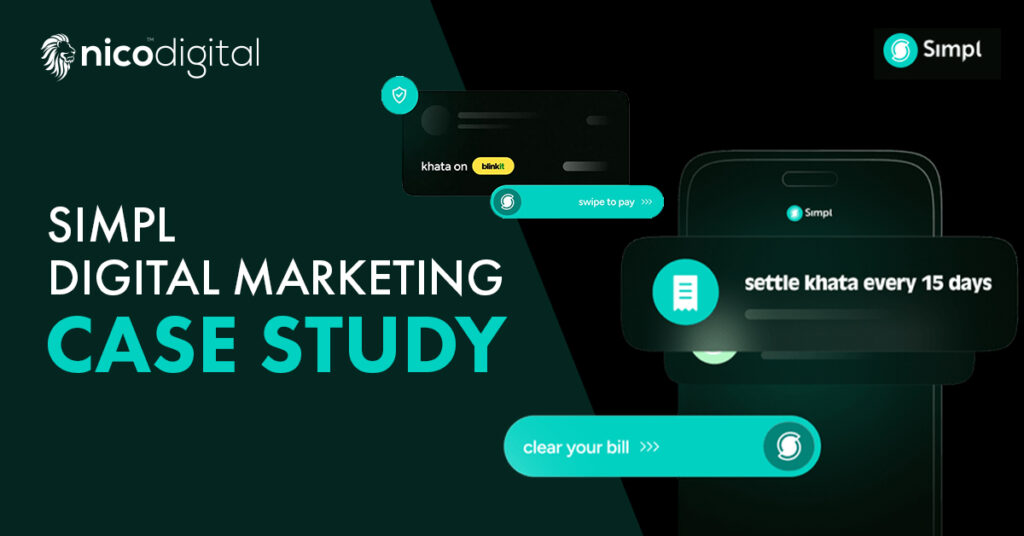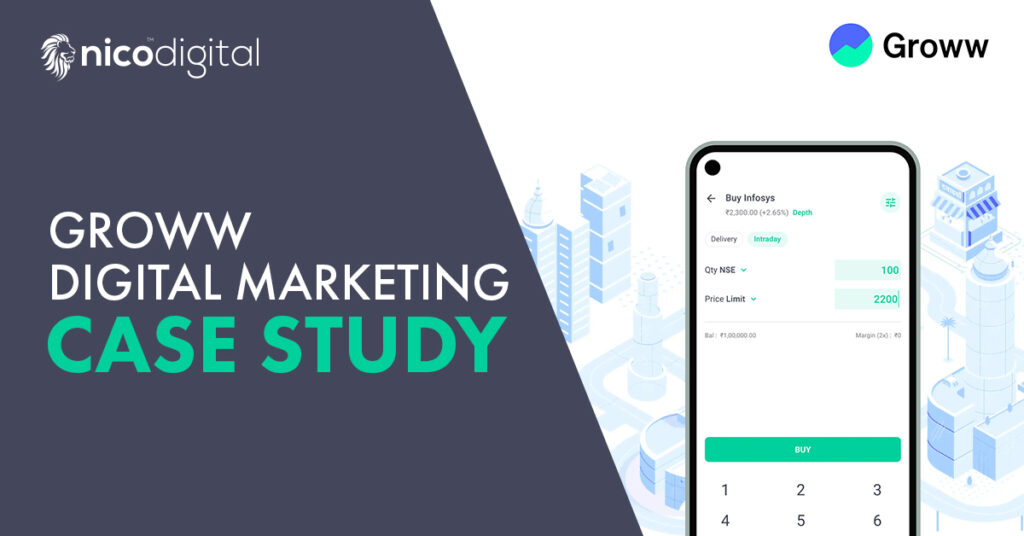
AI, AI, AI…..it’s everywhere.
And now it has dawned upon your favorite search engine – Google.
AI redefines what already exists, just like how Google searches are now getting redefined.
Step in, Generative Search Experience.
Powered by Google’s own PaLM 2 language model, Generative Search Experience is a relatively new feature that combines the power of Generative AI with your conventional search results.
Now you may have loads of questions in your mind. How will generative AI affect results? How will your search ads perform now?
Well, let’s dig deeper into the world of generative search and find answers to questions most of us are asking.
Table of contents
1. What is generative search experience?
2. How does generative AI work?
3. What is the difference between general AI and generative AI?
4. How will generative AI impact SEO & Google Search?
5. What will the Google search experience look like with Generative SEO?
6. What are the different types of queries that SGE can answer?
8. How does SGE handle sensitive or controversial topics?
What is generative search experience?
It was 10th May 2023, when Google announced a new addition to its existing search page – Generative search experience.
Now you may be asking, what is generative AI?
In simple terms, generative search experience is a trial version of Google’s existing search engine. It employs the power of generative artificial Intelligence or generative AI to generate responses to users’ search queries.
Google’s generative AI provides short answers to search queries. It also suggests additional sources for more details, offers follow-up questions, and sometimes includes extra features like a product carousel for shopping-related searches.
Google Search Generative Experience is based on the Pathways Language Model 2 developed by Google
How does generative AI work?
Generative AI uses neural networks to detect patterns in existing data to generate unique content, while unsupervised or semi-supervised learning methods are utilized during training for optimal results.
A major advancement of generative AI is its capacity for unsupervised or semi-supervised learning as part of its training regimen.
Training an AI model involves providing it with sufficient data – including text, code, graphics or any other form of relevant material – which allows it to learn. This material acts as the building blocks on which its knowledge grows and performance increases.
Search Generative Experience provides more interactive search results
What is the difference between general AI and generative AI?
General AI and generative AI represent two different aspects of artificial intelligence as a whole.
General AI refers to AI systems with human-like intelligence. This term is often used when categorizing AI systems collectively and can represent science fiction-esque scenarios where computers can reason, think and act independently.
Generative AI on the other hand is based on pre-existing sources of information. It aims to create new content or develop ideas based on information available to it. It is a more specified subset of general AI that is used for solving particular tasks.
How will generative AI impact SEO & Google Search?
You should be concerned about how your website performs on Google.

of the world’s online traffic comes from Google
Thus, you may be wondering, will the incorporation of generative AI affect SEO and search results in a significant way?
Well, the answer is Yes and No.
Let’s look at the ways in which generative AI will affect search and the ways in which it won’t.
1. Search strategy
Marketers and businesses cannot benefit by publishing simple information on widely accepted industry topics anymore. AI-powered search engines can now provide that information very accurately.
However, marketers can still attract visitors by sharing expert insights that assist people in making decisions about how to invest their time and money. Smart searchers trust a variety of perspectives in search results more than summaries generated by AI.
2. Content quality
With the advent of generative AI anyone can now create and publish good or high-quality content. Thus, these types of content will not rank well on Google anymore.
However, marketers who offer up-to-date news or extensive expertise won’t be greatly affected by generative AI because it doesn’t have access to the necessary training data to provide the same information.
3. SEO content creation
Marketers or businesses that use generative AI to write entire blogs or articles won’t have much to offer in relation to other SEO firms or businesses. Thus, it is unlikely that their sites will rank high.
However, generative AI can help create interesting content by generating tables, conducting research, assembling data, and creating interesting visuals that improve the skimmability of their content.
What will the Google search experience look like with Generative SEO?
With generative AI, users now can look forward to additional features, along with the old search experience, like:
• AI snapshot
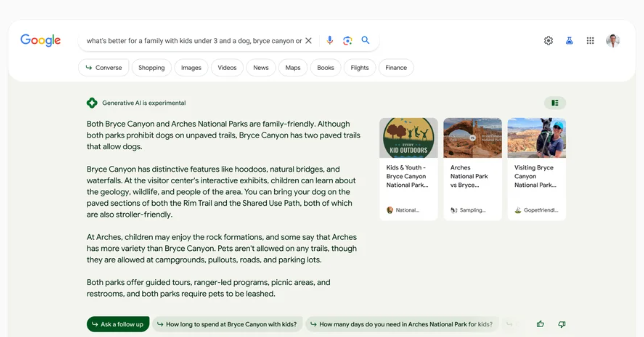
AI snapshot is a unique feature where users can get a short summary of long search queries. For example, if your search query is “What’s the best movie theatre near me that has 3d screens?”, Google will generate a short summary with the result.
You will also get 3 links for each snapshot. Google also has a feature called the “Bear Claw.” Clicking on this icon will allow users to see the source of information that formed each sentence of the AI snapshot.
• Conversational mode

Google searches don’t always stop after the initial question. SGE’s conversational mode is created to address subsequent questions while keeping the search context intact.
To activate the conversational mode, you can tap on “ask a follow-up” or choose one of the suggested next steps under the snapshot.
• Vertical experiences
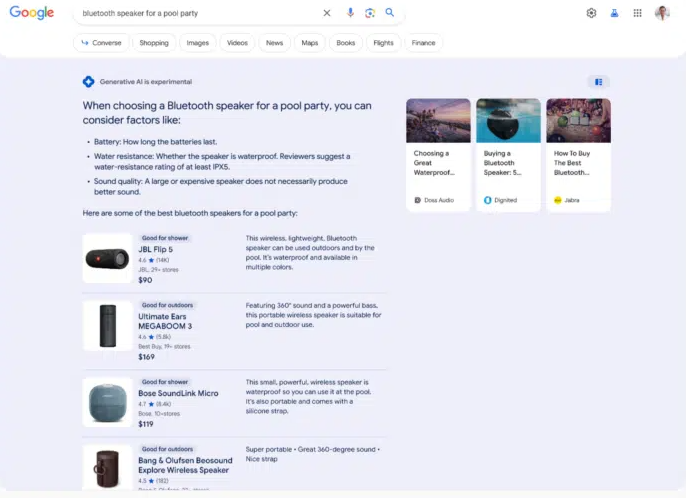
Google’s generative AI is also reshaping the way vertical searches are carried out, as these queries have multiple facets to them.
For example, you are looking to buy a mountain bike. However, you need one with gears in it, or maybe you want front suspension. You ask a follow-up query to Google regarding. Now, maybe you want a blue colored bike. You ask another follow-up query.
Google has been providing shopping suggestions for a while now. However, it will be fascinating to discover how they will be integrated into the AI snapshot.
Moreover, a report from Reuters suggest that Google will deploy generative AI to create sophisticated ad campaigns.
What are the different types of queries that SGE can answer?
Google’s generative search can answer most of your questions. Some queries that generative AI can answer are:
1. Informational queries
These are queries seeking factual information or knowledge about a specific topic.
2. Navigational queries
These queries are intended to find a specific website or web page.
3. Transactional queries
These queries involve an intention to perform a specific action, such as making a purchase or downloading a file.
4. Local queries
When users are looking for information about local businesses, services, or places in a specific area, they may use local queries.
5. Broad queries
These are queries where users are looking for a general overview or a wide range of information on a topic
But, there are some queries that Google’s generative AI will not answer. For example, if you ask Google whether you should take paracetamol in the morning or evening, it won’t display an answer.
Also, questions on finance are something that Google will be mum about.
Google’s SGE can answer-
- Informational queries
- Navigational queries
- Transactional queries
- Local queries
- Broad queries
Just like how normal searches are designed not to offend or shock people, Google’s generative search is designed in a similar manner.
How accurate is SGE?
SGE pulls up information from different reputed websites and stitches them together to display the final result.
In an accuracy, assessment study carried out by Search Engine Land, Google’s generative AI was asked to answer 16 queries.
- It was fully complete five times out of the total occurrences (31.25%).
- It was mostly complete four times out of the total occurrences (25%).
- It was significantly incomplete five times out of the total occurrences (31.25%).
- It was very incomplete twice out of the total occurrences (12.5%).
The information displayed on the AI snapshot panel is gathered from websites that Google has determined to be reliable and generally accurate.
Google’s generative AI is mostly accurate
How does SGE handle sensitive or controversial topics?
Google previously had content policies in place that ensure search results aligned with its guidelines and standards. These policies aim to prevent the promotion of hate speech, violence, or other harmful content.
In Google’s privacy & terms page, it clearly says that users must use generative AI in a legal and responsible manner.
Thus, if you are searching for controversial or sensitive topics, the chances are that you won’t get to see an AI-generated result. Instead, you might see a list of normal results on the search page.
What are the benefits of using SGE on Google Search?
Search generative AI will transform the way users search online. It can provide more dynamic and interactive features that will allow users to refine their search queries. Some benefits of using generative AI are:
• Autocomplete and query suggestions
Generative AI will give users helpful suggestions and complete their search queries as they type. These suggestions can help users find better search terms. This will make their searches more effective.
Thus users can modify their queries based on the suggestions – which can impact the search results they see and how they search in general.
• Instant results
Users can see instant search results as they type their queries. With this interactive feature, users can see results in real time, which can affect how they search. They can make their queries clearer, explore related topics, or get quick answers without finishing their whole query. This helps users stay up to date.
• Contextual search
Generative AI provides customized search suggestions based on an individual’s search history, location, and interactions with Generative AI. These personalized recommendations can influence their search habits by encouraging them to investigate certain topics further or revisit earlier searches.
• Personalised search
Generative AI makes searches more personal by using the user’s search history and preferences. By looking at what the user has done before, search engines customize the results, suggestions, and recommendations to match their likes and interests.
This personal touch affects how users search because they get content that is tailored specifically to them.
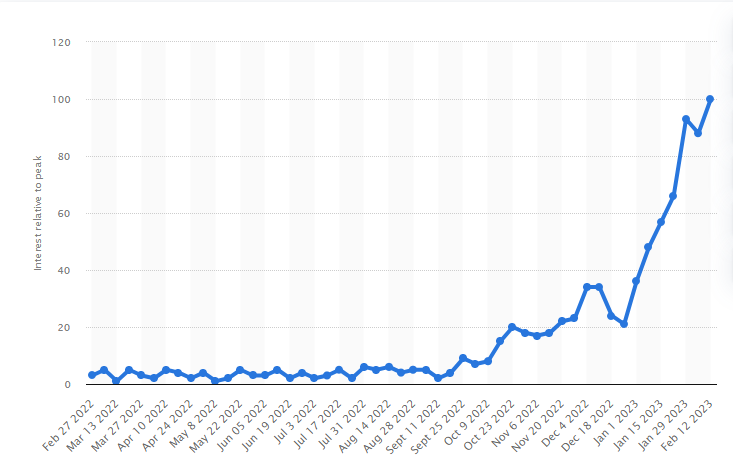
The above graph shows the interest in search generative experience from February 2022 to February 2023.
Source: https://www.statista.com/statistics/1367868/generative-ai-google-searches-worldwide/
What are the limitations of SGE?
SGE is still being worked on, so it has some limitations. It can sometimes not be completely accurate and may struggle with understanding complex queries. However, Google’s goal is always to improve this technology and they believe that in time these limitations will diminish.
Also, generative AI’s main drawback lies in its tendency to show inaccurate results. This leads to potentially incorrect or false information being produced or provided.
What is the future of SGE?
As technology progresses, SGE should become even more intelligent, intuitive, and user-friendly.
Below are some potential developments that could shape the future of SGE:
• Enhanced Natural Language Understanding
In the future SGE will have improved results for users’ search queries. This will allow for more accurate and relevant search results.
• Personalized results
SGE will become even better at customizing search experiences to individual users based on their preferences, interests, and prior interactions. This will provide users with more customized and contextually relevant search results and suggestions.
• Multimodal search features
SGE will expand beyond text-based searches and incorporate other forms of media, such as images, audio, and video. The result – users can search and explore information using various modalities.
• Augmented Reality (AR) and Virtual Reality (VR) Integration
SGE could integrate with AR and VR technologies, enabling users to search and explore information within immersive virtual environments or through augmented overlays in the real world.
My closing thoughts
Google’s search generative experience will make searches more relevant, intuitive, and user-friendly.
Thanks to advances in natural language processing, machine learning, and contextual understanding, users will receive tailored results with intelligent suggestions.
Though SGE still faces certain limitations and obstacles, such as accuracy issues and difficulty understanding complex queries, ongoing research and development efforts continue to enhance and develop its capabilities.








